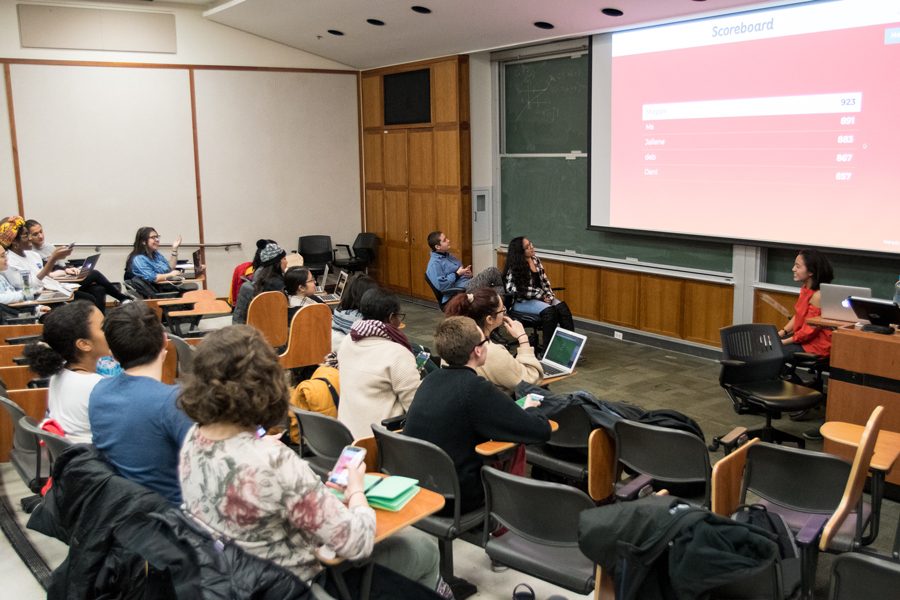Teach-in held to discuss petition for new academic departments
Colin Boyle/Daily Senior Staffer
Students at a teach-in hosted by the Latinx Asian American Collective play Kahoot as an introduction to their discussion. The Collective introduced a published proposal for the Latina and Latino Studies Program and the Asian American Studies Program to become departments within the University.
February 7, 2018
The Latinx Asian American Collective held a teach-in Wednesday to introduce a published proposal for the Latina and Latino Studies Program and Asian American Studies Program to become academic departments. It was the first of a series to educate students about the initiative.
Around 30 students attended the teach-in, which gave an overview of the programs and the proposal’s key points. These included the designated facilities and faculty members that would be provided if the programs become official departments.
The Collective was formed by the student groups MEChA de Northwestern and the Asian Pacific American Coalition. Members hoped the teach-in would raise awareness in students outside of the programs for their efforts, APAC member Isabella Ko said.
“The goal is to get the word out and have a reach beyond groups of people that we are always around,” the Weinberg sophomore said. “We want to get as much support as possible, especially in terms of seeking people willing to help with the collective.”
The teach-in was the first public meeting hosted by the Collective, which formed last quarter. The group also published a petition of support along with their proposal. It currently has about 830 signatures, with a goal of 1,000, according to members at the meeting.
Members want the voices of students of color to be heard and represented at Northwestern, said Erykah Nava, a member of the Collective’s education committee.
“When we enter these spaces, we should be allowed to transform them. That means being able to critique them and being able to disrupt them and give feedback,” the Weinberg sophomore said. “It’s important to not only take up space but know how we’re taking up that space, how we’re using our voices and going against being silent.”
One key point of the meeting was the need for designated space, which the proposed departments currently lack. Many professors do not currently have offices, making it difficult to arrange office hours or meetings with other professors, Nava added.
Additionally, due to a lack of money designated by the University, LLSP and AASP faculty members and directors must raise money for programs and research, Ko said.
“Most of their time is spent fundraising,” the Weinberg sophomore said. “Department heads, who are academics, have to fundraise and think about administrative things, giving them added pressure.”
Because programs are not primarily in charge of their own faculty and hiring, the departments that faculty are hired under have greater say in the courses taught and the research done.
Obligations to departments force faculty to work “two full-time jobs,” one with their department and one with their program, said June Choe, an education committee member.
“LLSP and AASP are their own fields with their own unique histories,” Choe added. “When they’re often treated like a special topic within another discipline, it makes us question whether we’re truly reflected in our courses or if the courses are really meant for us.”
Email: [email protected]
Twitter: @rachkupfer


